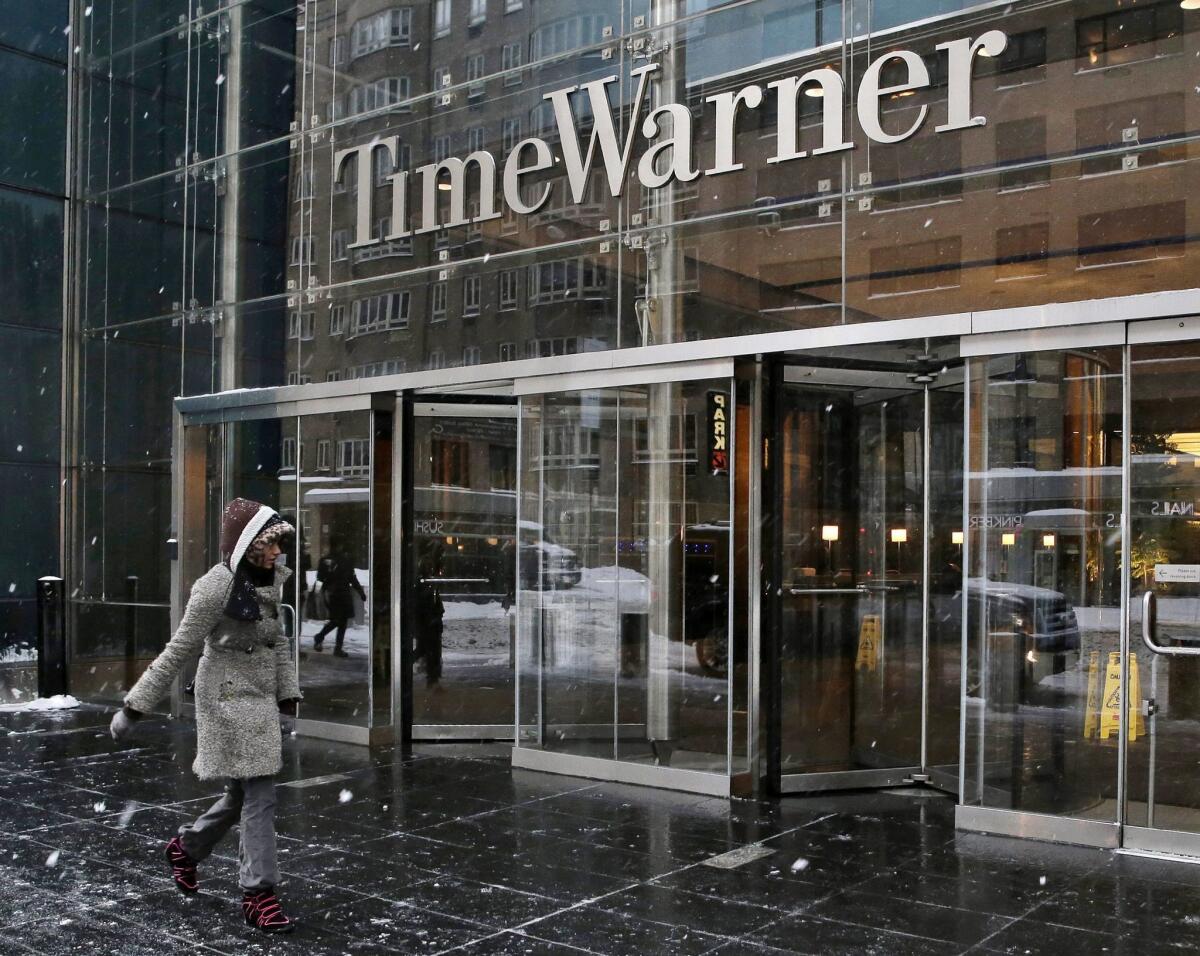AT&T closes in on deal to buy Time Warner Inc.

Looking to assemble an arsenal to compete against powerful technology titans Google and Apple, telephone giant AT&T is scrambling to seal a massive deal to buy a crown jewel of media — Time Warner Inc.
Time Warner owns HBO, CNN, TBS, TNT, Cartoon Network and Hollywood’s biggest television and film studio, Warner Bros. It has formidable programming, including the Harry Potter film franchise, DC Comics, blockbuster television shows such as “The Big Bang Theory” and “Game of Thrones,” and classic cartoon characters like Bugs Bunny.
The talks, confirmed by a person close to the situation, are moving at a rapid clip, and a deal could be imminent. The news sent Time Warner shares up 8% on Friday, placing its market valuation at nearly $70 billion. AT&T, however, would have to pay a premium, making the deal worth about $85 billion. Some analysts expressed skepticism that AT&T could pull off such a huge transaction just 15 months after the Dallas phone company swallowed satellite television service DirecTV — or even if a such a combination made much sense.
“It’s eat or be eaten,” said Amy Yong, a media analyst with Macquarie Capital. “Traditional competitors are no longer the real threat. You are really going up against huge Silicon Valley tech companies that have deep pockets and are willing to invest.”
The media merger wave is in full swing, and comes as traditional phone companies sweep up entertainment assets in a fight to secure their future. Earlier this year, competing mobile phone carrier Verizon Communications agreed to pay $4.8 billion for Yahoo’s core assets.
AT&T Chief Executive Randall Stephenson, 56, a former accountant from Oklahoma, has been particularly aggressive about molding the old Ma Bell for the digital age. The company, now valued at $230.6 billion, has poured billions of dollars into upgrading its network infrastructure as more customers use their mobile phones to consume videos and music.
Last year’s $49-billion takeover of DirecTV catapulted AT&T into the nation’s largest pay-TV operator with more than 25 million customers. Later this year, it plans to launch a streaming service, DirecTV Now, a package of channels offered via the Internet to appeal to millions of people who are considering cutting the cable TV cord.
AT&T wants to intertwine itself into daily lives of consumers as cellphones become indispensable. The company also has tried to grow its revenues by bundling its services and has offered generous incentives for AT&T phone customers to subscribe to DirecTV.
Buying Time Warner would give AT&T access to first-class TV and movie production capabilities, and premier media brands. For example, AT&T could blast CNN stories and videos to its cellphone users. Cellphone subscribers could add on HBO or a Turner Classic Movies package. And it would give AT&T a greater reach into sports, as Time Warner’s Turner unit has rights to basketball, baseball and e-sports.
Owning content has become an increasingly more valuable part of the media equation, particularly as media companies — including Time Warner — push into foreign markets.
”Everybody’s trying to turn into a new media business as opposed to an old media business.” said Cowen & Co. media analyst Doug Creutz, who expressed skepticism about the logic of such a combination. “Marrying content and distribution has been tried several times in the past, with generally poor results.”
But the prospect of massive mergers underscores how nervous traditional phone and media companies are about their future. Landline phones are going out of style, and cable TV providers offer faster Internet service than phone companies. Younger consumers prefer upstart streaming services such as Netflix to traditional cable TV channels such as CNN or TNT.
Traditional players have watched technology upend their businesses. Netflix has outpaced — and outspent — Time Warner’s HBO to become the dominant premium content service, with more than 85 million subscribers worldwide. And Google has aggressively been moving into cellphone service.
“The space has evolved a lot, and for these companies the pressures on their core wireless business is very high,” Yong said. “Every carrier is looking for a different way to position their own bundle, and having premium content is one way to do that.”
The talks, which are said to have accelerated in recent days, also suggest Time Warner finally has shaken off its long hangover from its disastrous union with AOL more than a decade ago. That deal that has been described as the worst merger ever because it obliterated the value of the two companies, led to sweeping layoffs and ruined retirement funds — without providing the hoped-for synergies.
But several analysts questioned whether AT&T might be overreaching.
“It makes no sense,” said Creutz. “You’re paying a lot of money to do something you could have done by just licensing content from Time Warner. Vertical integration doesn’t really work in this business.”
Should AT&T pull off a deal, it would represent the biggest in the latest wave of media mergers. It would become a much larger version of the massive deal structured by Philadelphia cable giant Comcast more than six years ago to buy NBCUniversal, which gave Comcast distribution outlets and valuable media properties, including NBC, CNBC and Universal Studios.
Already this year, Charter Communications absorbed Time Warner Cable (which was separate from Time Warner), NBCUniversal bought Jeffrey Katzenberg’s DreamWorks Animation for $3.8 billion, and movie studio Lionsgate is in the process of buying the Starz premium movie channel in a deal worth $4.4 billion, including debt.
CBS Corp. separately is mulling whether to combine with Viacom Inc., which owns Paramount Pictures, MTV, VH1 and Comedy Central. Both companies are controlled by Sumner Redstone and his family. Verizon invested in the youth-oriented YouTube network AwesomenessTV.
The Walt Disney Co., which owns cable sports network ESPN, responded to the seismic shifts in August by acquiring a 33% stake in the video streaming service BAMTech. The Burbank entertainment giant was even rumored to have considered making separate bids for Netflix and Twitter.
Such a colossal combination between AT&T and Time Warner would likely trigger antitrust concerns in Washington. It is unclear whether a Hillary Clinton or Donald Trump administration would look favorably on such a merger. On Friday, consumer rights activists questioned the wisdom of the deal, saying it would give AT&T too much power — and too much data about its customers.
Clinton, in particular, has been pressured from senators on the left, including Bernie Sanders (I-Vermont) and Elizabeth Warren (D-Mass.), to distance herself from corporate interests and favor consumers over big companies.
Executives also pointed to AT&T’s massive debt and noted that AT&T is still trying to migrate some of DirecTV operations into AT&T. AT&T already has $117 billion in debt on the books from its acquisitions and network upgrades. (Time Warner has $24 billion in debt).
Analysts also question why Time Warner would want to sell now, or if AT&T is rushing to complete a deal before a tech company, such as Google or Apple, swooped in. Representatives of Google and Apple declined to comment.
Under Chairman and Chief Executive Jeffrey Bewkes, Time Warner has systematically scaled down the company, making it a more attractive takeover target. The company purged AOL, spun off its cable TV distribution service and, more recently, spun off the magazine unit, which includes Time, People and Sports Illustrated.
Two years ago, the company rebuffed a hostile takeover from Rupert Murdoch and his sons. That deal was valued at $80 billion and could have led to collapsing many competing units such as CNN and Fox News or the major Hollywood film studios Warner Bros. and 20th Century Fox.
The company was rattled by the hostile takeover, and Bewkes insisted that Time Warner would be better off on its own because it had a plan to grow value.
But selling Time Warner for what some believe could be as much as $100 billion including debt would please investors, who may be eager for an exit as traditional media companies face more turbulence.
“If you were to take a long-term view, it makes sense,” said analyst Yong. “This gets AT&T into the entertainment business.”
Times staff writer Paresh Dave contributed to this report.
See the most-read stories in Entertainment this hour »
More to Read
From the Oscars to the Emmys.
Get the Envelope newsletter for exclusive awards season coverage, behind-the-scenes stories from the Envelope podcast and columnist Glenn Whipp’s must-read analysis.
You may occasionally receive promotional content from the Los Angeles Times.







